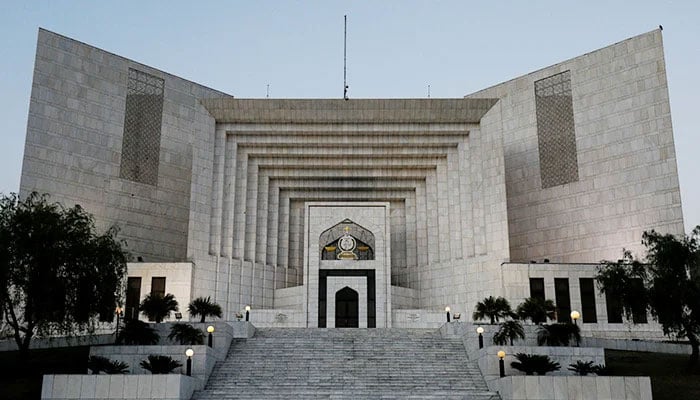‘Democrats don’t protest like this’: May 25 incident must not repeat, says Supreme Court
The government filed a contempt of court plea with the apex court against Imran Khan over his long march to Islamabad
ISLAMABAD: What happened on May 25 must not be repeated.
Those who believe in democracy do not protest like this, remarked Chief Justice of Pakistan Justice Umar Ata Bandial while heading a five-member bench hearing a case concerning the violation of a court order that defined the limits of the PTI’s Azadi March.
Justice Ijazul Ahsan, Justice Muneeb Akhtar, Justice Yahya Afridi and Justice Mazahar Akbar Naqvi are the other bench members. Supreme Court Bar Association (SCBA) President Ahsan Bhoon appeared in the court.
The court sought a detailed reply from Imran by November 5 bearing his signature and the relevant videos from Imran’s lawyers. In the previous hearing, the court had rejected the government’s request to issue a show-cause notice to Imran and sought replies from him and his lawyers on an undertaking given by the PTI that the march would not proceed to the D-Chowk.
In his reply submitted on the interior ministry’s contempt plea on Monday, Imran had claimed he was not aware of any such undertaking made before the court. He had also sought more time to submit another reply by November 3 (today).
The federal government has filed a contempt of court plea with the Supreme Court against the PTI chairman over his long march to the federal capital, say media reports. In its petition, the government said, “Imran Khan is making announcements to attack Islamabad”, which was a violation of a court order. It urged the apex court to direct the PTI chief to ensure the implementation of its orders related to the protests and sit-ins.
“We are giving another chance to Imran for an explanation,” said Chief Justice of Pakistan Umar Ata Bandial adding that the court had been proceeding with ‘caution and patience’. The decision came with the chief justice’s observation that the material available with the court justified the issuance of a notice to the former premier. “According to the material available with the court, a notice should be issued to Imran Khan. We are still giving him a chance to explain,” he said.
Bhoon informed the court that he was representing the PTI lawyers Babar Awan and Faisal Chaudhry, who had been served notices. At this, the chief justice said the court had not served any notices but only sought replies from the two lawyers.
He said the court will hear the arguments by the government’s lawyer and the replies will be examined later. Additional Attorney General Amir Rehman maintained that Imran Khan had sought time for a detailed response. “Khan had given a surety but he has expressed unawareness towards any assurance or the judicial orders,” he said.
At this, the chief justice inquired about the difference in time between the first and second orders of the court on May 25. After the response by the additional attorney general, the CJP remarked that the time between the two orders was for taking directives. The court wasn’t informed from whom the directives were taken, he added.
At this, Rehman told the court that as per Faisal Chaudhry, the directives were taken from Asad Umar as he couldn’t speak to Khan. CJP Bandial asked why wasn’t the court informed if anyone couldn’t be contacted. “This needs to be explained. The court trusted Babar Awan and Faisal Chaudhry but none of them said that they didn’t get the directives,” CJP Bandial said.
He said the two Supreme Court lawyers, of whom one was a senior lawyer, misled the court and breached its trust. The chief justice remarked that lawyers acted as the court officers and there was a bond of trust between the two.
He further remarked that when the party lawyers had not contacted the senior party leadership, then why the court was not informed in this regard. He said the court orders should be fully respected. The chief justice remarked how Imran Khan knew about the court order.
He said the assurance was given by the senior PTI leadership and it started with Imran Khan. “Imran Khan sought time for a detailed answer,” he added. Justice Yahya Afridi observed that nobody could be allowed to disturb the life of 200,000 people by bringing 10,000 protesters.
-
 Harry Styles Opens Up About Isolation After One Direction Split
Harry Styles Opens Up About Isolation After One Direction Split -
 Shamed Andrew Was ‘face To Face’ With Epstein Files, Mocked For Lying
Shamed Andrew Was ‘face To Face’ With Epstein Files, Mocked For Lying -
 Kanye West Projected To Explode Music Charts With 'Bully' After He Apologized Over Antisemitism
Kanye West Projected To Explode Music Charts With 'Bully' After He Apologized Over Antisemitism -
 Leighton Meester Reflects On How Valentine’s Day Feels Like Now
Leighton Meester Reflects On How Valentine’s Day Feels Like Now -
 Sarah Ferguson ‘won’t Let Go Without A Fight’ After Royal Exile
Sarah Ferguson ‘won’t Let Go Without A Fight’ After Royal Exile -
 Adam Sandler Makes Brutal Confession: 'I Do Not Love Comedy First'
Adam Sandler Makes Brutal Confession: 'I Do Not Love Comedy First' -
 'Harry Potter' Star Rupert Grint Shares Where He Stands Politically
'Harry Potter' Star Rupert Grint Shares Where He Stands Politically -
 Drama Outside Nancy Guthrie's Home Unfolds Described As 'circus'
Drama Outside Nancy Guthrie's Home Unfolds Described As 'circus' -
 Marco Rubio Sends Message Of Unity To Europe
Marco Rubio Sends Message Of Unity To Europe -
 Savannah's Interview With Epstein Victim, Who Sued UK's Andrew, Surfaces Amid Guthrie Abduction
Savannah's Interview With Epstein Victim, Who Sued UK's Andrew, Surfaces Amid Guthrie Abduction -
 Piers Morgan Supports Bad Bunny As US Lawmakers Seek Action
Piers Morgan Supports Bad Bunny As US Lawmakers Seek Action -
 Jennifer Love Hewitt Reminisces About Workign With Betty White
Jennifer Love Hewitt Reminisces About Workign With Betty White -
 Hilarie Burton Reveals Valentine's Day Plans With Jeffrey Dean Morgan
Hilarie Burton Reveals Valentine's Day Plans With Jeffrey Dean Morgan -
 Harry Styles Silently Deleted Instagram App
Harry Styles Silently Deleted Instagram App -
 Cardi B Compares Her Fall To Government At Las Vegas Show
Cardi B Compares Her Fall To Government At Las Vegas Show -
 Harry Styles Reveals Biggest Lesson Learnt During Music Hiatus
Harry Styles Reveals Biggest Lesson Learnt During Music Hiatus




